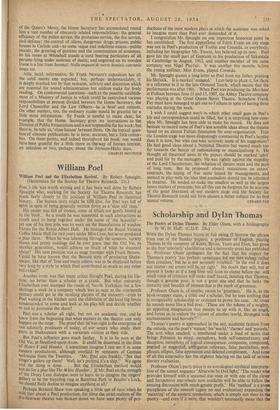William Poel
William Poel and the Elizabethan Revival. By Robert Speaight. (Heinemann for the Society for Theatre Research. 21s.) POEL'S life was worth writing and it has been well done by Robert Speaight who, working for the Society for Theatre Research, has stuck fairly closely to the position of William Poel in theatrical history. The human story might be told also, for Poel was full of Spirit in spite of being generally written down as a 'dear old man.'
His career was full of ironies, some of which are gently hinted at in the book. As a youth he was interested in such abstractions as Youth used to lump together under the name of 'the beautiful'— yet one of his first jobs was to work on the manufacture of window frames for the Royal Albert Hall. He managed the Royal Victoria Coffee Music Hall for two years under Miss Cons, but never produced a play there. When he was labouring through the concerts, variety shows and penny readings did he ever guess that the Old Vic, in another generation, would achieve so much of what he dreamed about? His next position was as stage manager with Frank Benson. Could he have known that the Benson style or producing Shake- speare, like that of Tree and many others, was to be displaced before very long by a style to which Poel contributed as much as any other individual?
Another irony was that many critics thought Poe!, during his life- time, no better than a scholar or a crank. But what university Elizabethan ever tramped the roads of North Yorkshire for a few shillings a week in a company which was as near as the nineteenth century could get to the strolling players of the sixteenth—even to Poel waiting in the kitchen until the chatelaine of the local big house condescended to come and look at his play-bill and decide whether or not to patronise the show?
Poe! was a scholar all right, but not an academic one, and he knew from the beginning that what matters in the theatre can only happen on the stage. The proof that hawas right is the emergence of our scholarly producers of today, of our actors who study their Parts in Shakespeare with a variorum edition at their side.
But Pool's influence goes much farther. It is to be seen at the Old Vic, at Stratford-upon-Avon. It could be discerned in the films of Henry V and Hamlet. 1 sometimes imagine I can see it in some
modern productions, although overlaid by remnants of German technique from the Twenties. 'Mr. says frankly, "See that
singer's gallery up there! Well, let's pretend it's a ship." We agree and the thing is done. . . . But the Elizabethan method would not do for a play like The White Heather. If Mr. Poel on the strength
ductions of the most modern plays in which the audience was asked to imagine more than Poel ever demanded of it.
I congratulate Mr. Speaight on one important historical point he has established. The first appeartnce of Edith Evans on any stage was not in Poel's production of Troilus and Cressida, as everybody, including her biographer Mr. Trewin, has believed up to now. Poel gave her the small part of Gautami in his production of Sakuntala at Cambridge in August, 1912, and another member of the same company was Nigel Playfair. It was another five months before the young milliner, Miss Evans, played Cressida.
Mr. Speaight quotes a long letter to Poel from my father, praising his Shylock. It is marked' undated.' I can help to place it, for there is a reference in it to the late Osmond Tearle, which means that the performance was after 1901. When Pool was producing the Merchant at Fulham between June 11 and 15, 1907, the Abbey Theatre company was playing at the Great Queen Street Theatre. Somehow Frank Fay must have managed to get out to Fulham in spite of having three matinees during the week.
I wish I could suggest ways in which other small gaps in Pool's life and correspondence could be filled, but it is surprising how com- plete Mr. Speaight has been able to make his record. He does not hesitate to record some of Poel's less sensible ideas about the theatre based on an almost Fabian fanaticism for over-organisation. True the London stage was more disgustingly commercial in Peel's heyday than it is now, but who can take seriously some of his suggestions? He had good ideas about a National Theatre but veered much too far towards the heresy of nationalising or municipalising it. He thought all theatrical news in the papers should be marked 'advt' and paid for by the managers. He was rightly against the stupidity of the Lord Chamberlain, the inflation of theatre rents and the peril of long runs. But he proposed absurd restrictions on actors' contracts, the taxing of free scats issued by managements, and seemed to play with the idea that journalists should not be admitted to theatres. He tended to make the smallest as well as the largest issues matters of principle, but all this can be forgiven for he was one of the great liberators of our modern stage and the Society for Theatre Research could not have choscn a better subject for its first
annual volume. GERARD FAY


































 Previous page
Previous page